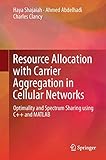Resource Allocation with Carrier Aggregation in Cellular Networks [electronic resource] : Optimality and Spectrum Sharing using C++ and MATLAB / by Haya Shajaiah, Ahmed Abdelhadi, Charles Clancy.
By: Shajaiah, Haya [author.] .
.
Contributor(s): Abdelhadi, Ahmed [author.] | Clancy, Charles [author.]
| Clancy, Charles [author.] | SpringerLink (Online service)
| SpringerLink (Online service) .
.
Material type:  BookPublisher: Cham : Springer International Publishing : Imprint: Springer, 2018Edition: 1st ed. 2018.Description: XVI, 201 p. 65 illus., 62 illus. in color. online resource.Content type: text Media type: computer Carrier type: online resourceISBN: 9783319605401.Subject(s): Telecommunication
BookPublisher: Cham : Springer International Publishing : Imprint: Springer, 2018Edition: 1st ed. 2018.Description: XVI, 201 p. 65 illus., 62 illus. in color. online resource.Content type: text Media type: computer Carrier type: online resourceISBN: 9783319605401.Subject(s): TelecommunicationChapter 1. Introduction -- Chapter 2.Utility Functions and Resource Allocation for Spectrum Sharing -- Chapter 3.Multi-Stage Resource Allocation with Carrier Aggregation -- Chapter 4.Resource Allocation with User Discrimination for Spectrum Sharing -- Chapter 5.Resource Allocation with Carrier Aggregation for Commercial Use of 3.5 GHz Spectrum -- Chapter 6.RA with CA for a Cellular System Sharing Spectrum with S-band Radar -- Chapter 7.Utility Proportional Fairness Resource Block Scheduling with Carrier Aggregation -- Chapter 8.Conclusion and Future Trajectory.
This book introduces an efficient resource management approach for future spectrum sharing systems. The book focuses on providing an optimal resource allocation framework based on carrier aggregation to allocate multiple carriers’ resources efficiently among mobile users. Furthermore, it provides an optimal traffic dependent pricing mechanism that could be used by network providers to charge mobile users for the allocated resources. The book provides different resource allocation with carrier aggregation solutions, for different spectrum sharing scenarios, and compares them. The provided solutions consider the diverse quality of experience requirement of multiple applications running on the user’s equipment since different applications require different application performance. In addition, the book addresses the resource allocation problem for spectrum sharing systems that require user discrimination when allocating the network resources.


There are no comments for this item.